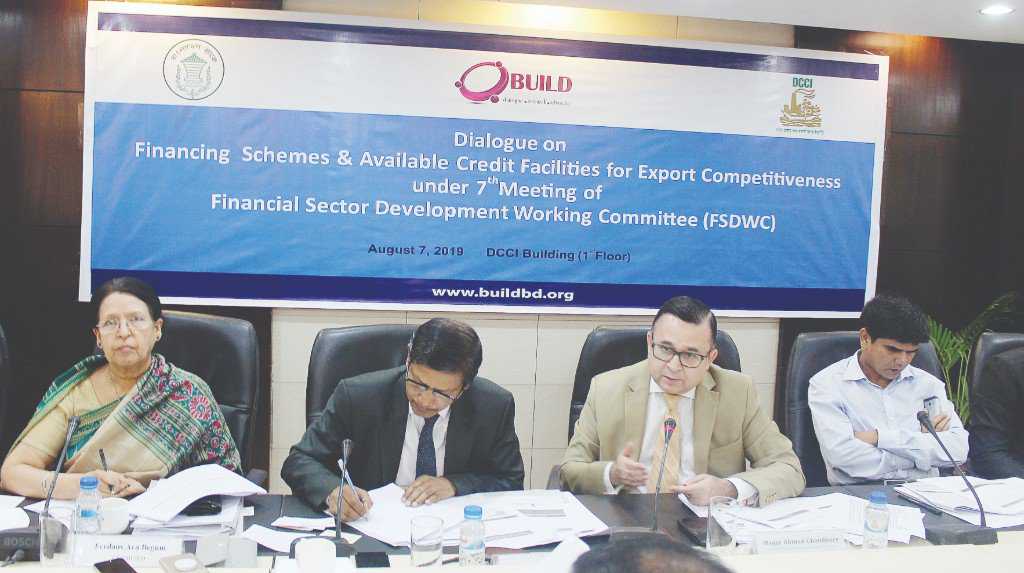Credit lines stressed for maximizing export competitiveness

Image collected
The entrepreneurs participating in the program called for a simplified trade licence for marginal women entrepreneurs and an earmarked fund from the recently announced 100 crore start-up funding
The Business Initiative Leading Development (BUILD) has called for ensuring financial schemes and credit lines for exporters in order to maximize export competitiveness.
The recommendation came up at a dialogue on financing schemes and available credit facilities for export competitiveness under the 7th meeting of the Financial Sector Development Working Committee (FSDWC).
BUILD organized the meeting in capital on Wednesday.
BUILD Research Associate Hasnain Kamran made a presentation on “Financing Schemes and Available Credit Facilities for Export Competitiveness of Bangladesh”.
BUILD Economist Nusrat Tania made another presentation on “Access to Collateral Free Loan for Women Entrepreneurs in Bangladesh”.
Hasnain Kamran in his presentation laid importance on different pre-shipment finance and post shipment financing schemes for export competitiveness that includes export development fund, long term financing facility, green financing, green transformation fund, refinancing schemes by Bangladesh Bank and Islamic Shariah-based finance, packing credit, factoring etc.
He also proposed some alternative financing such as mezzanine structures, special funds, impact funds, subordinated bonds and many others.
He also informed that there were a number of credit lines for green financing but the exporters were not aware about them.
Speaking as chair of the dialogue, Bangladesh Bank Deputy Governor Ahmed Jamal said: “We have simplified the foreign exchange guideline to support the private sector and are implementing a number of reforms for export competitiveness."
He also said the Ministry of Industries drafted the SME Policy 2019 and was currently awaiting approval of the Cabinet Division, which was not coordinated with the Bangladesh Bank.
He requested the Ministry of Industries to hold a coordinated meeting with them before gazetting the SME Policy 2019.
Economist Nusrat Tania in her presentation showed how the SMEs in Bangladesh were constrained by limited access to credit, leaving them with a financing need while the second study unveils constraints during availing collateral-free long-term credit for SMEs run by women entrepreneurs.
She recommended guarantor identification, personal guarantee, group based loan, setting standards for definition of new entrepreneurs.
Senior vice president of DCCI Waqar Ahmad Choudhury urged the government for looking for alternative financing facilities rather than borrowing all funds from public sector banks while implementing mega projects.
The entrepreneurs participating in the program called for a simplified trade licence for marginal women entrepreneurs and an earmarked fund from the recently announced 100 crore start-up funding.
BUILD CEO Feradus Ara Begum briefed the working committee members about the implementation of last working committee meeting and said that demand for loans increased but complicated process was driving entrepreneurs away.
Commissioner of the Bangladesh Securities and Exchange Commission (BSEC) Swapan Kumar Bala informed that venture capital fund could also be explored for the women entrepreneurs.
In case of venture capital funding, he said, a number of reforms were taken but stamp duty at the rate of 2% still remained which increased upfront cost of the entrepreneur. These issues have been hampering the funding issue of the new entrepreneurs, he observed.
Shah Md Ahsan Habib, director of BIBM, laid emphasis on both demand and supply side of funding so that the gap could be minimized.
The other proposals were mixed funding, simplification of packing credit policy by utilizing offshore banking, extension of the limit of LTFF for more than one year by Bangladesh Bank, reduction of the documentation needs, incentive facilities for cottage, micro and small over and above improving the mindsets of banks were recommended by the participants.
Source: https://www.dhakatribune.com
Previous Story
- Industries minister emphasizes improving product, services quality
- Corporate tax: Bangladeshi entrepreneurs pay highest in South...
- DCCI for separate SME bank
- Study suggests formalizing electric vehicles for employment and...
- ATA Carnet System implementation will help boost trade:...
- Jute to be Bangladesh’s future: Jute Minister
- Speakers: Need more research, innovation for jute seed...
- Abul Kasem Khan: Biggest challenge in our economy...